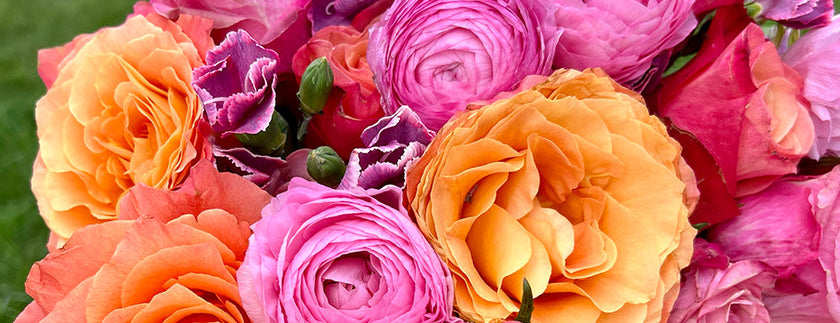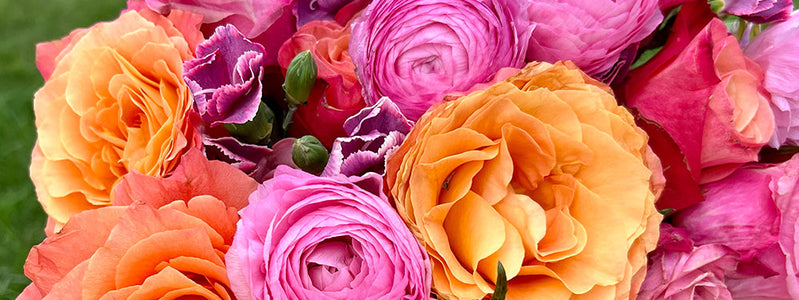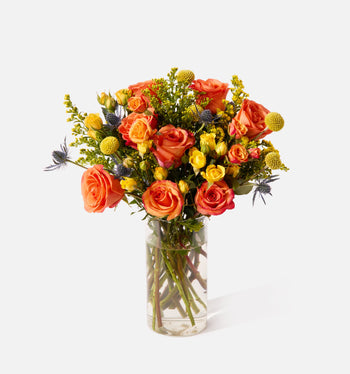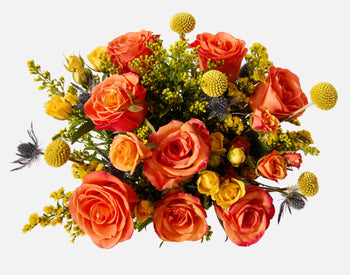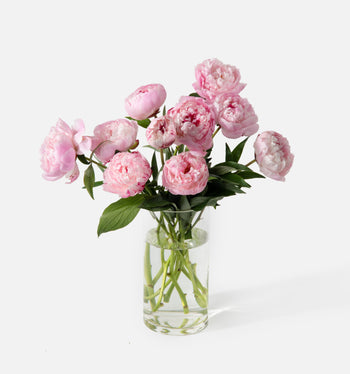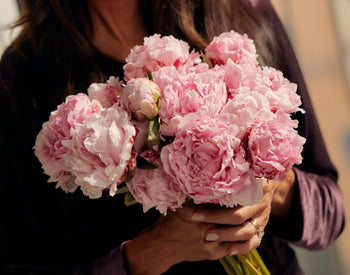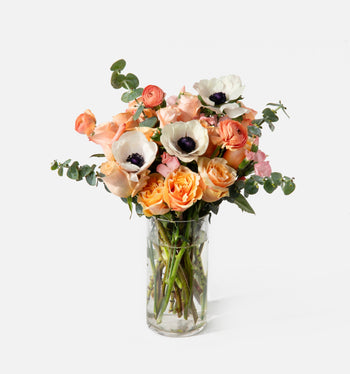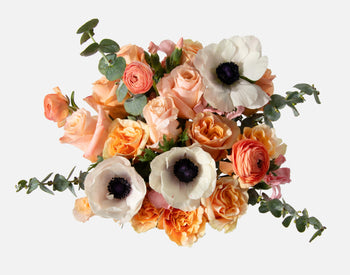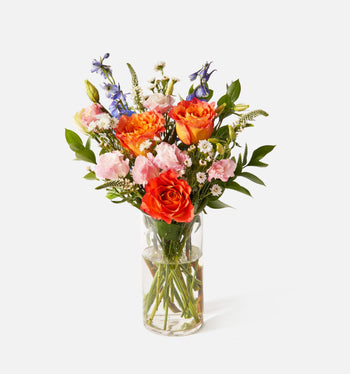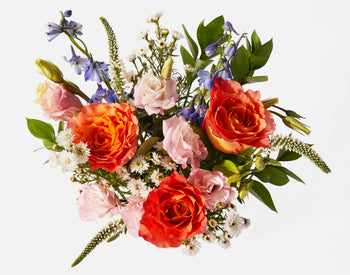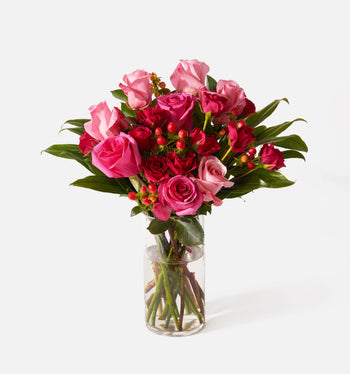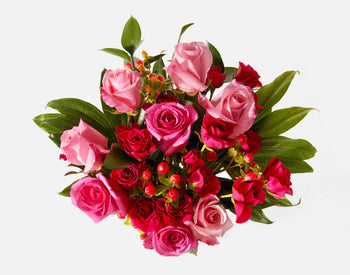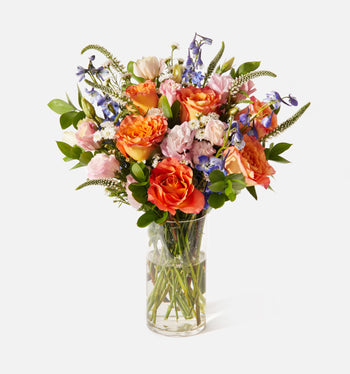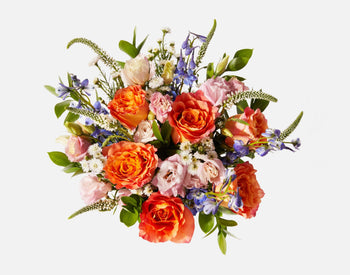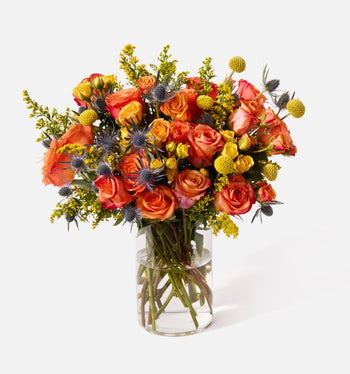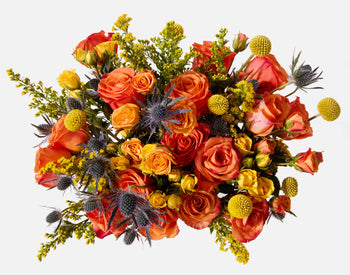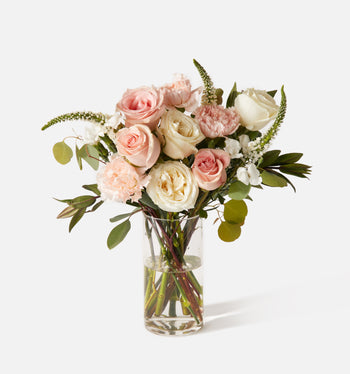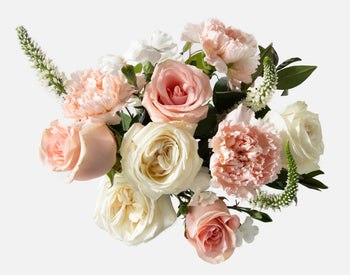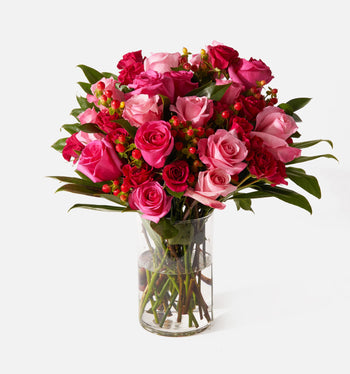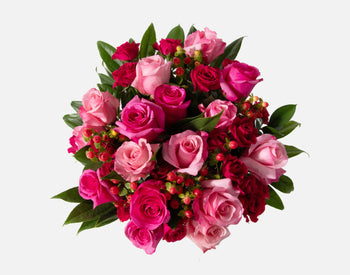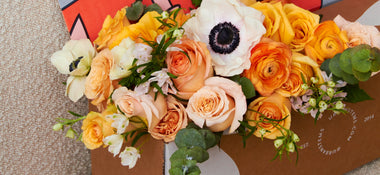The 1893 Chicago World’s Fair famously introduced several modern innovations, from elevators to zippers to voice recordings. It’s also the reason we have official state flowers; it was the World Fair's Women’s Congress that suggested each state should choose a floral emblem to represent something special or unique about its culture.
Today, every state has an official flower. Some have even declared more than one, opting to choose an official wildflower as well.
Do you know what your state’s flower is? Let’s dive in and take a look at the official flower for every state.
Alabama: Camellia

The goldenrod was initially named the state flower of Alabama in 1927. However, the camellia was chosen to replace it in 1959 after a campaign by residents who complained that the goldenrod was a weed.
Alaska: Forget-Me-Not

The official state flower of Alaska is the forget-me-not. The choice was inspired by Benny Benson, a 13-year-old boy who won a contest to design the state’s flag. The blue of the flag was inspired by the forget-me-not.
Arizona: Saguaro Cactus Blossom

The Arizona state flower is the saguaro cactus blossom. An individual saguaro blossom generally blooms for less than 24 hours, opening in the evening and then closing in the desert heat the following day.
Arkansas: Apple Blossom

The legislature of Arkansas officially named the apple blossom as the state flower in 1901. Arkansas likely owes its proliferation of apple trees to John Chapman. Better known as Johnny Appleseed, Chapman planted apple trees in nearby states throughout the early 1800s.
California: California Poppy

The California poppy was designated as the state flower in 1903. The flower grows in the wild across the state and is considered an important enough symbol to also have its own day. On April 6 each year, Californians celebrate California Poppy Day.
Colorado: Columbine

Colorado’s state flower is the columbine. The flower was originally chosen by a vote of Colorado schoolchildren and then officially adopted by the state’s legislature in 1899. These flowers are for looking, not touching, It’s illegal to pick columbine in the state.
Connecticut: Mountain Laurel

The mountain laurel was adopted as Connecticut’s state flower in 1907. This is also a flower that should be looked at and not touched. It’s not illegal to pick mountain laurels, but most parts of the flower are poisonous to humans and animals.
Delaware: Peach Blossom

Once known as the Peach State due to its number of peach trees, Delaware named the peach blossom as its state flower in 1895. In the early 1900s, a viral disease known as the Peach Yellows wiped out most of the state’s peach trees.
Florida: Orange Blossom

Florida’s state flower is the orange blossom, reflecting the importance of oranges to the state. Orange trees were introduced to Florida in the 1500s by Spanish missionaries, with the first trees likely planted by Ponce de Leon.
Georgia: Cherokee Rose

The state flower of Georgia is the Cherokee rose, named after the Native American tribe that called the state home before being forced out in the 1830s. The flower has a short bloom period, appearing each year only during late March and into April.
Hawaii: Yellow Hibiscus

The yellow hibiscus was considered Hawaii’s territorial flower before it officially became a state. This native flower grows only in Hawaii and is rare enough to be an endangered species.
Idaho: Syringa

The Syringa, also known as “mock orange” for its resemblance to orange blossoms, is the state flower of Idaho. Formally designated in 1931, the flower also appears on the state seal, developed in the 1890s. The Syringa is toxic to cats.
Illinois: Violet

The violet is the state flower of Illinois, chosen by a vote of the state’s schoolchildren in 1907. Although multiple states eventually adopted the violet as their official flower, Illinois was the first.
Indiana: Peony

The peony replaced the zinnia as the state flower of Indiana in 1957. The state holds the unofficial record for the most different state flowers; previously, the carnation and the tulip tree flower had held the honor.
Iowa: Wild Rose

The official state flower of Iowa is the wild rose. Although the multiple wild rose species are native to the state, the Iowa legislature did not specify one over the other when selecting the wild rose in 1897.
Kansas: Sunflower

Known as the Sunflower State, Kansas officially designated the sunflower as a state symbol in 1903. Each year, the city of Goodland hosts a Sunflower Celebration to show off its 50,000 acres of sunflower fields.
Kentucky: Giant Goldenrod

The giant goldenrod was named the state flower of Kentucky in 1926. Before that, Bluegrass had been named the state flower, even though it isn’t a flower.
Louisiana: Magnolia

Louisiana named the magnolia its state flower in 1900. In 1950, the Society for Louisiana Iris attempted to have the state flower changed to the iris, but they were unsuccessful.
Maine: White Pine Cone

Maine is the only state with a current state flower that is not a flower! Instead, in 1895, the state legislature named the white pine cone as its official state flower.
Maryland: Black-eyed Susan

The state flower of Maryland is the black-eyed Susan. Officially chosen by the legislature in 1918, the black-eyed Susan won a statewide vote in 1898, edging out the goldenrod.
Massachusetts: Mayflower

The Mayflower was designated as the official flower of the state of Massachusetts in 1918. This native wildflower is endangered, and it is a crime to dig up or pick mayflowers on public land in the state.
Michigan: Apple Blossom

The state of Michigan adopted the apple blossom as its state flower in 1897. Michigan is the third-leading producer of apples in the United States.
Minnesota: Pink and White Lady's Slipper

The pink and white lady’s slipper was officially chosen as the state flower in 1902. The delicate blooms of this flower take their time growing; it can take up to 16 years for these plants to produce their first flower.
Mississippi: Magnolia

The school children of Mississippi chose the magnolia as its state flower in 1900 (although it wasn’t made official by the legislature until 1952). The state is home to the largest magnolia tree in the country—a 122-foot tall tree in Smith County.
Missouri: Hawthorn Blossom

Missouri designated the hawthorn blossom as its official state flower in 1923. The state is home to over 75 different species of hawthorn.
Montana: Bitterroot

Montana’s state flower was chosen by a statewide referendum in 1894. While more than 32 different flowers received votes, the bitterroot was the overwhelming winner.
Nebraska: Goldenrod

The legislature of Nebraska adopted the goldenrod as its state flower in 1895. An opposing bill favoring the violet was also submitted, but the goldenrod eventually prevailed, appropriate for a flower known for its ability to survive.
Nevada: Sagebrush

The sagebrush was adopted as Nevada’s state flower in 1917. This flowering shrub also provides Nevada with its unofficial nickname (the Sagebrush State) and appears on its state flag and the commemorative Nevada quarter.
New Hampshire: Purple Lilac

New Hampshire designated the purple lilac as its state flower in 1919, even though this flower is not native to the state. It’s believed the first lilacs ever imported to the United States were planted in Rochester, which is now known as Lilac City.
New Jersey: Violet

The state of New Jersey officially adopted the violet as its state flower in 1971. The resolution to designate the violet was initially introduced in 1913; however, it took nearly 60 years for the legislature to finalize the designation.
New Mexico: Yucca

The yucca flower became the state flower of New Mexico in 1927. Although the state is home to numerous species of yucca, no one specific variety of this hardy, sword-shaped plant was specified by the legislature.
New York: Rose

The legislature of New York named the rose as the state flower, but not until 1955. New York schoolchildren had voted on the state flower as far back as 1890, although the results of that vote were never made public.
North Carolina: Dogwood

The flowering dogwood was named the state flower of North Carolina in 1941. State legislators initially tried to name the azalea as the state flower, but popular sentiment demanded that they choose the dogwood instead.
North Dakota: Wild Prairie Rose

In 1907, North Dakota selected the wild prairie rose as the official state flower. Growing alongside the highway, in pastures, and in gardens, the state's rough style and strong character is embodied in the five pink petals with yellow stamens in the center.
Ohio: Red Carnation

Ohio’s state flower is the red carnation. It was chosen in 1904 to commemorate the death of President (and Ohio resident) William McKinley three years prior. McKinley had often worn a carnation on his lapel.
Oklahoma: Oklahoma Rose

The state of Oklahoma designated a floral symbol before it even became a state. Unfortunately, not everyone was happy with the choice of mistletoe. After multiple attempts at amending this choice, the Oklahoma Rose was finally approved by the state legislature in 2004.
Oregon: Oregon Grape

The Oregon grape was named the state flower in 1899. Despite the name, the Oregon grape is indeed a flower and not a grape.
Pennsylvania: Mountain Laurel

In 1933, Pennsylvania became the second state to designate the mountain laurel as its state flower. The Pennsylvania legislature passed two bills naming state flowers, with the other designating the pink azalea. Governor Gifford Pinchot was left to deliberate between the two, eventually choosing the mountain laurel.
Rhode Island: Violet

The schoolchildren of Rhode Island chose the violet as the state flower in a vote that took place in 1897. However, that designation wasn’t made official until 1968.
South Carolina: Yellow Jessamine

South Carolina adopted the yellow jessamine as its state flower in 1924. Native to the state, the plant has a sweet fragrance but is extremely poisonous when eaten.
South Dakota: Pasque

The pasque flower was named South Dakota's state flower in 1902. The law designating the pasque flower also includes the motto “I lead,” making South Dakota the only state with a state flower that also has a motto.
Tennessee: Iris

The iris was named the state flower of Tennessee in 1933. Although the legislature did not specify a particular color, the state government maintains that the purple iris best represents the state.
Texas: Bluebonnets

Texas is well known for its bluebonnets, and they were named the state flower in 1901. Future vice president John Nance Garner lobbied hard for the prickly pear cactus instead, earning him the lifelong nickname of “Cactus Jack.”
Utah: Sego Lily

The sego lily was named the state flower of Utah in 1911. The plant is considered sacred to many Native Americans and provided a much-needed source of food for Mormon settlers in the mid-1800s.
Vermont: The Red Clover

Vermonters chose their state flower by popular vote in 1894. The winner, the red clover, was officially designated the state flower later that year by the legislature.
Virginia: American Dogwood

The state of Virginia adopted the American dogwood as its state flower in 1918. It’s also the state tree, making Virginia the only state to have the same plant as its state flower and state tree.
Washington: Coastal Rhododendron

The coastal rhododendron was adopted by the Washington legislature in 1959 as the official flower of the state. Washington was the first state to unofficially choose a state flower in 1892 via a popular vote of more than 15,000 women.
West Virginia: Rhododendron

The rhododendron is also the state flower of West Virginia. The flower was chosen via a referendum of the state’s schoolchildren in 1902 and approved by the legislature the following year.
Wisconsin: Wood Violet

The state flower of Wisconsin is the wood violet. The violet beat out the rose, water lily, and trailing arbutus in a 1909 vote. However, the designation wasn’t made official until 1949.
FAQs
How are the state flowers chosen?
State flowers are chosen through a combination of historical, cultural, and ecological considerations. They often involve state government and public input for their selections where it becomes a symbol of pride for the region.
What state does not have a state flower?
All 50 states have an officially designated state flower. The first state to choose a flower was Maine and the last state to select a flower was Arizona.
